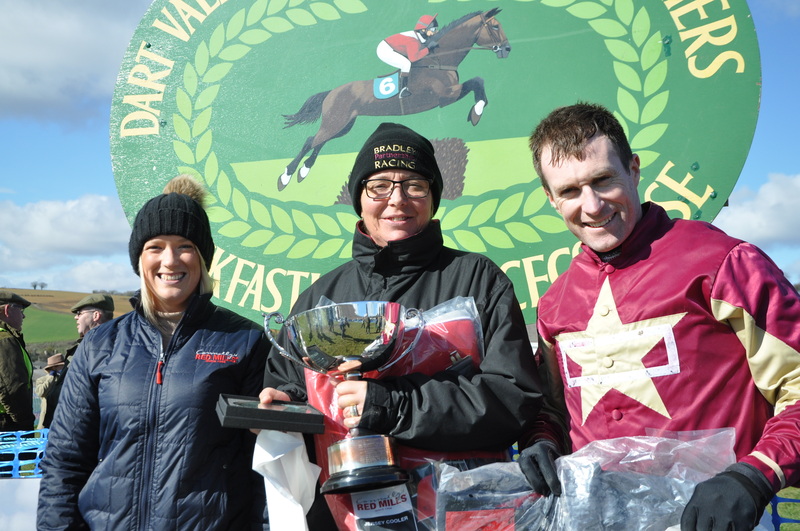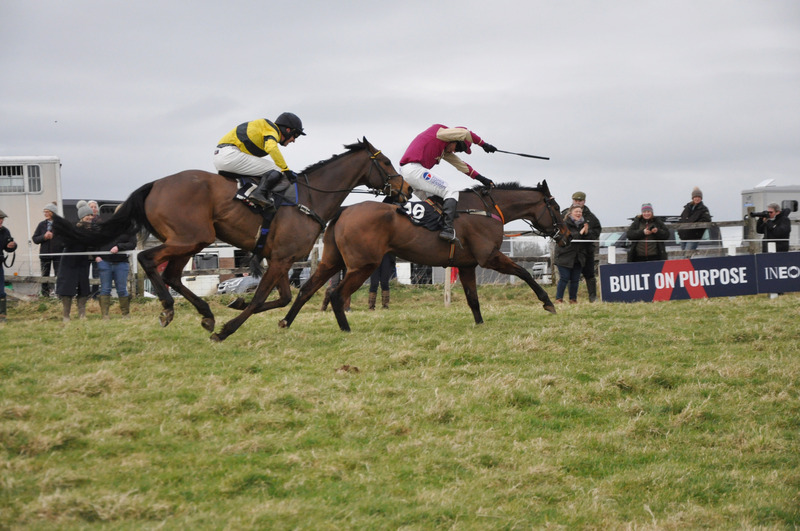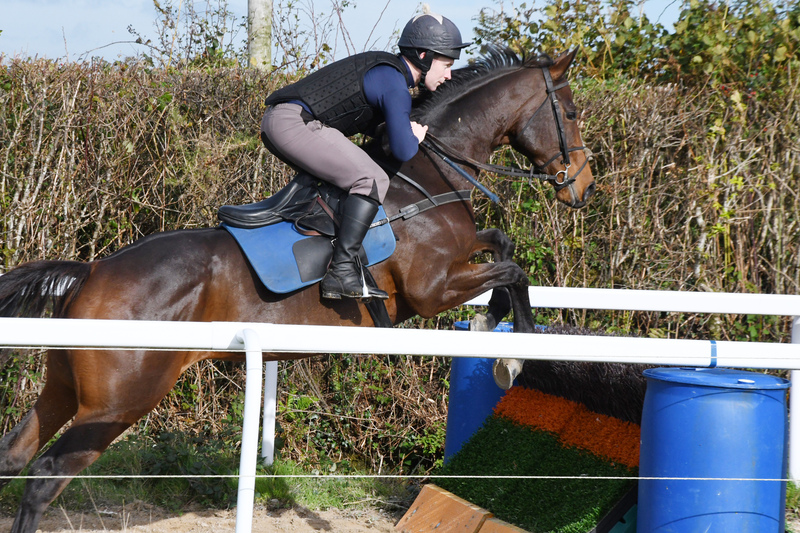What a note to end on. Darren Edwards’ memorable, 24-year journey as an amateur rider came to a close in unbeatable style at Umberleigh in North Devon on Saturday.
Exmoor-based Edwards rode in two races, notched a double and leapt two rivals to snatch Devon & Cornwall’s male rider title, a championship he had won on multiple occasions. No less memorably, the second leg of the double was his 100th victory for trainer Dean Summersby, completing an association which has benefited both men with a wealth of winners.
He says: “I would have been happy with one winner, but to ride two was special. They were both odds-on favourites and Lakota Warrior was a bit of a shoo-in, but we know horses can underperform. The open race was quite competitive for the time of year, but Dorrells Pierji is very talented. To finish on a good horse was nice.”

Riding Lakota Warrior to victory at Umberleigh, the first leg of a final-day double (photograph: Tim Holt)
After the usual Umberleigh celebratory duckings with water and champagne, Edwards was able to reflect on a tally of 330 point-to-point winners plus 19 in hunters’ chases. He rode 18 point-to-point winners during 2023/24, all but one for Summersby, and says: “It’s strange to think I didn’t ride a winner until mid-March, but have ended up with a 36 per cent strike rate for the season, a personal best.”
A chance ride and win on the Summersby-trained Cherry Vine in 2013 started the link that led to Edwards’s glorious farewell during a season in which Summersby became Britain’s Foran Equine champion trainer for yards with six to 14 horses. Edwards says of their relationship: “We both had a similar approach to racing and were keen to keep improving, whether that was as a trainer and rider or in terms of the horses. At the end of a season we would look at the results and say ‘Is it time to free up that stable?’ otherwise you are just going to plateau.”

With Dean Summersby at the trainer's yard on the Devon/Cornwall border (Ce)
Following on from A P . . .
Coming from a lengthy family line of horsemen and women, Edwards is the son of permit holders Gordon and Angela. It was on home-trained horses that Edwards, at the age of 16, initially rode in races under rules in the autumn of 2000 while waiting for the point-to-point season to commence. In the November of that year he broke his duck on his parents’ Eileen Alanna in a hurdle race at Market Rasen, slightly more than six years after their Chickabiddy had scored at Exeter providing the legendary Sir A P McCoy with his first winner over jumps.
Edwards opened his point-to-point account in February 2001 on the Vic Greenway-trained Blade Of Fortune at Chipley Park – beating Godfrey Maundrell by a head – but the season ended soon after due to foot and mouth.

Eileen Alanna becomes Edwards' first winner when scoring over hurdles
Three years later he hit a high when winning the Fulke Walwyn Kim Muir Chase at the Cheltenham Festival on the 40/1 shot Maximize trained by Martin Pipe. Of that ride, he says: “It was at the time that Martin Pipe and Paul Nicholls were vying for the trainers’ championship, and Mr Pipe entered six or seven horses for the race. After finding jockeys for five [including Gordon Elliott, Tom Malone, Ashley Farrant and Leslie Jefford] there was a couple spare, and my sister Gemma, who had been working in Mr Pipe’s office for a couple of years, said ‘My brother will ride one’.
“He was the outsider of the lot and a bit of a monkey, but he got up near the line. If I could have done it again I would have appreciated it far more a second time, but I was just pleased to be there, which was a success in itself. I never thought of winning.”
That victory in the colours of multiple champion owner David Johnson led to a number of further rides for Pipe’s yard, including one on Not Left Yet in the 2007 four-mile National Hunt Chase. The rider says: “It was only his second run over fences, and they told me to hunt him round and bring him through late. I pulled him out for a bit of daylight running downhill to the third-last fence and he took off under me, became a bit unbalanced and fell. That has always felt like one that got away.”
Of rides that have given him the most satisfaction he says: “It’s hard to single one out – winning on an odds-on favourite can be satisfying because you’ve got to go and do it and it’s still a relief. Riding for Luke Harvey was always a lot of fun. He rang one day and said At The Races wanted to film the experience of running a point-to-pointer so he was going to take Porlock Bay [not the Will Biddick-trained Foxhunters’ Chase winner] to Cottenham. Neither Luke nor I had been to the track, and Jason Weaver led me up, but we won and it completed a rather nice story. That was satisfying.”
Point-to-pointing so good for a horse
He says the different experiences of race riding were among his best moments in the sport, and he singles out riding in Ireland in the Anglo/Irish challenge as “good fun”, while he places his final winner, Dorrells Pierji, among a group of horses that rate among his best. To that list he adds Chris Honour’s Poole Master, one of only two rides in Aintree’s Foxhunters’ Chase, the other being the Patricia Shaw-trained Joacci who fell at the first, and the stablemates Bradley Brook, Sykes and The Two Amigos who were trained near his home by Nicky Martin.

With permit holder Nicky Martin (centre) who trained Welsh National winner The Two Amigos (Ce)
He says: “The Two Amigos had been running under rules, but had become disappointing. We took him back to point-to-pointing and he won five on the bounce before getting a cob on and running out with me one day. He went back under rules and was the biggest certainty first time out for a handicap chase off 110 [easy 5/2 winner at Newton Abbot] and he later won the Welsh National. He is one example of how point-to-pointing can be so good for a horse.”

Driving Sykes to victory in a race at Great Trethew (not the race referred to near the end of this article) (Ce)
He also reflects fondly on Lucette Annie, Coombe Hill and Honest Deed, all of whom he rode to victory on more than ten occasions.
Edwards was the Point-to-Point Owners’ & Riders’ Association’s southern representative for a number of years, and in 2022 he became an independent member of the Point-to-Point Authority Board, His three-year tenure is completed at the end of this year, although he can stand again.
He says: “Joining the board was a huge eye-opener. You cannot just allow things to decline and you have to make difficult decisions to sustain the sport. There are a lot of different dynamics going on and it is a fine balance in keeping the areas and stakeholders on side. Peter Wright did a fantastic job at a difficult time [Wright recently left his job as chief executive]. He was very good at analysing statistics and using them to try and keep races competitive at a time when horse and rider numbers were coming down.”

Schooling Russian Invasion over a baby fence for trainer Dean Summersby (Ce)
Of the decision to end the season two weekends earlier than normal, leaving a pair of Devon & Cornwall fixtures to race outside of that period, Edwards says: “I can understand the argument for shortening the season given the reducing number of horses registered to race. Uncompetitive racing is not good for the sport. Fortunately, we have ended with a healthy number of runners [at Bratton Down and Umberleigh] but that may prove an anomaly following a season when so many meetings were called off and, with recent showers, there has been just enough moisture in the ground to encourage runners. The new ruling actually worked against me as I had four winners after the official end to the season.”
Looking ahead he says. “Am I optimistic for the sport? It would be easy to say yes, but that statement alone would be naïve. There are challenges and until we face them it is hard to know the right action to take. Will a Labour government put a further squeeze or outright ban on hunts, and if so, when and how will pointing cope?
“The economic challenge remains, and so the sport has a lot of hurdles to overcome. It is going to require strong leadership and input from all the stake holders.”

Riding Accordingtoharry at Wadebridge for trainer Nicky Martin
A chartered surveyor who joined Fisher German in 2006 when it had 150 employees and has risen to become a partner in the business now employing 800 people, Edwards has juggled a full work schedule with a hobby that required time for riding out, schooling and racing. He says his decision to call it a day just shy of his 40th birthday was in part due to Summersby’s decision to take out a full licence with plans for runners under rules later this summer.
He says: “Having a full-time office job I needed 70 to 80 rides a season for fitness and weight management. This year it’s been harder than ever to manage those two elements because of the number of abandoned meetings.”
His list of things to do is remarkably light on ink, for he says: “Between work, and home life and racing there’s been no time to plan for anything else. Church and cream teas maybe, and a house that needs some renovation.”
Never rely on a rival
Inevitably after 24 seasons and heading towards 2,000 rides in all forms of racing, Edwards has experienced some nuanced situations.
He says: “I was riding in a race at Great Trethew, and turned for home and the downhill run to the second-last fence with just one other rival alongside – I won’t name the jockey. Going to two out he said ‘Is there another circuit to go?’ so I said ‘Yes’. He stood up in the irons, while I gently eased ahead as we hit the rising ground, jumped the last and won.
“On another occasion I was riding at Umberleigh in the season that Evan Williams won the national championship. We both had rides in the open race, as did Tim Vaughan. At the bottom of the track there is a fence which you jump into another field which is a good bit higher on the landing side.
“On the final circuit Tim and I were upsides in front, with Evan about six or seven lengths behind, when we heard him say ‘Go round the fence lads’. It appeared the fence had been dolled off with hexagonal markers, so I eased Tim over and we went round it, but it was an optical illusion.
“The markers were in the ditch at the following fence in the next field, but because it was on higher ground it had appeared they were in the one we had just run past. Evan didn’t follow us and jumped the fence with a wry smile before going on to win – and ultimately secure the championship over Richard Burton. It is fair to say Tim was apoplectic at the time but we look back now and joke about it.”

Former national champion Evan Williams, always difficult to beat - and on one occasion harder than that (Ce)